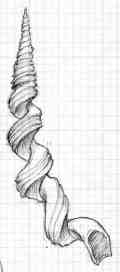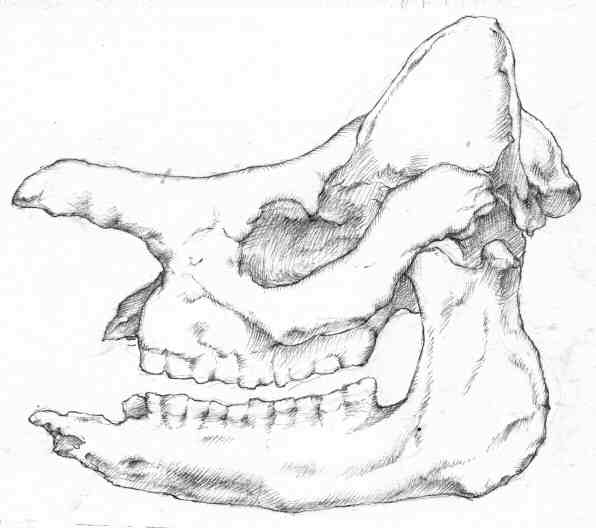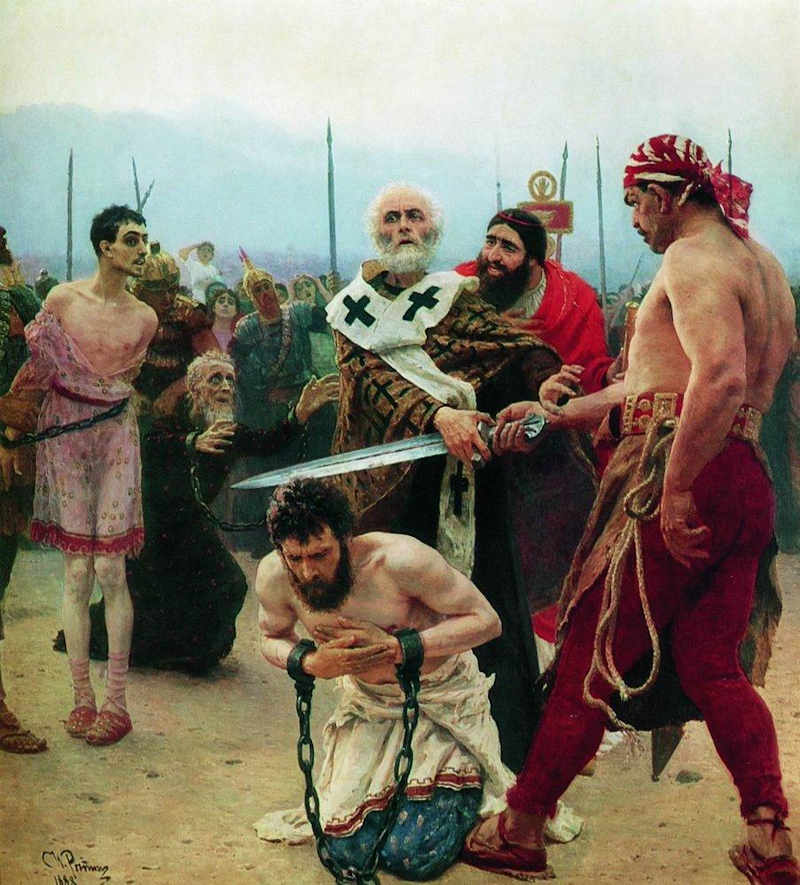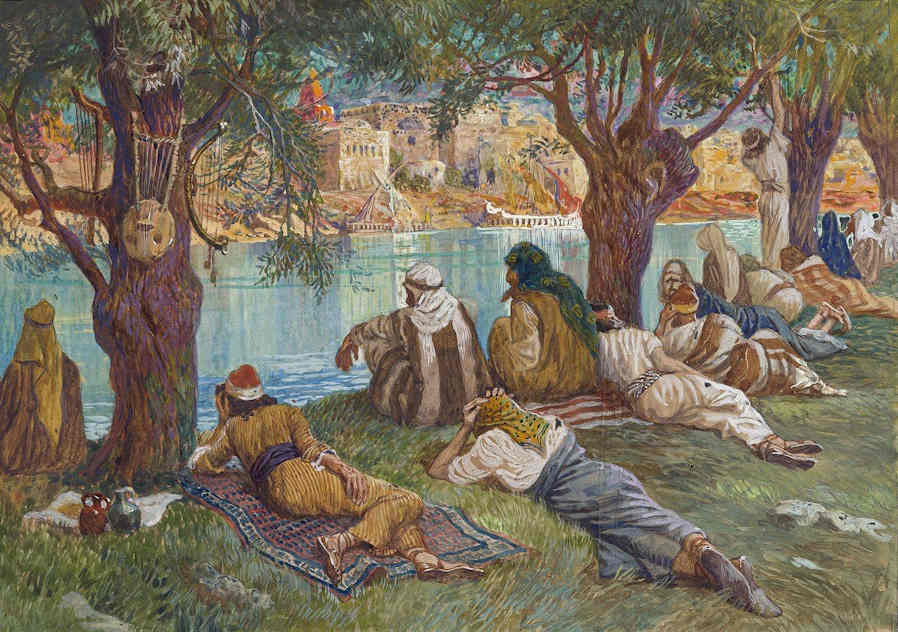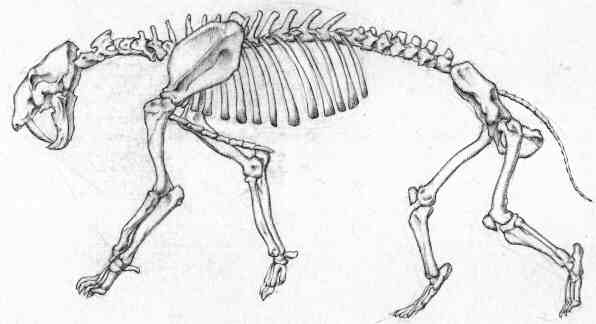White Racism
When Moses married an Ethiopian woman, the local 'White
Citizen's Council' grumbled. God indulged in a little 'symbolic speech' to set them straight:
"Then Miriam and Aaron spoke against Moses because of the Ethiopian woman whom he had married; for he
had married an Ethiopian woman...So the anger of the LORD was aroused against them, and He departed.
And when the cloud departed from above the tabernacle, suddenly Miriam became leprous, as
white as snow. Then Aaron turned toward Miriam, and there she was, a leper. So Aaron said to Moses,
'Oh, my lord! Please do not lay this sin on us, in which we have done foolishly and in which we have
sinned.'" (Numbers 12:1-11 NKJV).

Mark of Cain
God having made His feelings about white racists plain,
where do the atheists get their information that the Bible teaches blacks are inferior to whites?
From solid, substantial Bible arguments, that summarize the plain,
unvarnished truth of the Bible, or from imaginative Bible interpretations that don't pass the straight-face test? The
two major ones are the 'mark of Cain' and the 'curse of Ham.' Cain
committed the first murder and was subsequently marked, for protection
from vengeance:
"And Cain said unto the LORD, My punishment is greater than I can bear.
Behold, thou hast driven me out this day from the face of the earth; and from thy face shall I be hid; and I shall be a fugitive and a vagabond in the earth; and it shall come to pass,
that every one that findeth me shall slay me.
And the LORD said unto him, Therefore whosoever slayeth Cain, vengeance shall be taken on him sevenfold. And the LORD set a mark upon Cain, lest any finding him should kill him."
(Genesis 4:13-15).
Whatever
the 'mark of Cain,' the first murderer, may have been, it was not a
trait he was born with. Are acquired characteristics passed on to offspring,
or not? So why would an acquired characteristic
like the 'mark of Cain' be passed on to Cain's descendants at all? The Bible says nothing about
Cain's descendants inheriting the 'mark', which was placed on Cain to protect him from vengeance.
Why
his descendants would need such protection is far from obvious, if they
had not murdered: "Then the LORD said to him, 'Not so!
Whoever kills Cain will suffer a sevenfold vengeance.' And the LORD put a mark on Cain, so
that no one who came upon him would kill him." (Genesis 4:15). If Cain was not born with this
characteristic — and he was not — then in the ordinary course of nature, his descendants would
not inherit it. While God could certainly change Cain's genetic make-up if He willed the 'mark' to
be inherited, where in the text does it suggest He wished to do so?
Even if the 'mark of Cain' were imagined to be a heritable character
versus 'a tattoo', where does the text even hint that the 'mark' is 'black complexion', versus 'a
birthmark shaped like the State of Utah', or 'red hair', or an 'epicanthic fold'? Nor is the 'mark'
placed on Cain to mark him out for ill-treatment, but rather precisely to protect him from
ill-treatment. Reassembling the atheist/racist house of cards for the moment, if we were to allow
the speculation that the 'mark of Cain' were heritable, and that the 'mark of Cain' were black
skin, and that the 'mark of Cain' was intended to mark its possessor out for ill-treatment, then why
would only one of Noah's sons have inherited this character? One commonly expects brothers to be of
the same race, not different ones. Who, of the eight persons saved
aboard the ark, from whom all subsequent humanity trace their ancestry,
was a descendent of Cain? If one of the wives of Noah's sons is
imagined to be a descendent of Cain, then realize that the same cannot
be said of her sons, because descent is reckoned patrilineally.
There is
no descendent of Cain who disembarked from the ark. This 'Bible argument'
implodes upon itself. Enter Jefferson Davis, who explains that the
people who inherited Cain's mark, and who entered Noah's ark though they
were not in the lineage of Noah, are unmentioned by the Bible because
black people are just advanced animals, who did not merit mention:
"Adam had driven away the first White criminal, his son
Cain, who was 'no longer the fit associate of those who were created
to exercise dominion over the earth,' Davis lectured the senators.
Cain had found in the 'land of Nod those to whom his crime had
degraded him to an equality.' Apparently, Blacks had lived in the
Land of Nod among the 'living creatures' God had created before
humans. Blacks were later taken on Noah's ark with other animals."
(Ibram X. Kendi, Stamped from the Beginning, Chapter 16, p. 28 of
43).
This is not a Bible argument. Biblical interpretation seeks to pry
out from the text its meaning. This is an imaginative riff improvising
off of Biblical characters and place names. But any interpretation is
good enough if you don't really care what the Bible says.

Curse of Ham
Next, the white supremacists move on to Noah's curse against
Canaan. This 'Bible argument' is not simply willed into existence as
is the 'mark of Cain,' but it involves of necessity a sleight of
hand, a shell game, the switch of one party for another, because
Noah cursed the 'wrong' grandson for the intended purpose. Noah
uttered a curse against Canaan, the ancestor of the idolatrous
nation displaced by Israel: ". . .he said, 'Cursed be Canaan; lowest
of slaves shall he be to his brothers.'"
(Genesis 9:25). Black Africa is not Canaan, but
Cush: "Whereas the Blackamores are not descended of Canaan, but of
Cush. Psl. 68. 31. 'Princes shall come out of Egypt [Mizraim], Ethiopia
[Cush] shall soon stretch out her hands unto God.' Under which names,
all Africa may be comprehended; and the promised conversion ought fo be
prayed for." (Samuel Sewall, The Selling of Joseph, a
Memorial). If Cush is Black Africa, who is Canaan? The
inhabittants of the holy land prior to Israel's occupation: "For Canaan
is the person cursed three times over, without the mentioning of Cham.
Good expositors suppose the curse entailed on him, and that this
prophecy was accomplished in the extirpation of the Canaanites, and in
the servitutde of the Gibeonites." (Samuel Sewall,
The Selling of Joseph, a Memorial.) It's somebody else entirey!
The text as written will not do. How can a curse against Canaan be transformed
into a blanket condemnation of Ham, Canaan's father, and also the
father of Cush (black Africans are called 'Cushites' in the Bible).
Generally, the racist interpreters transform this passage into a curse upon
Africans, by displacing it back a generation, from Canaan to Ham. What they need is for Cush,
the progenitor of the black Africans, to be cursed. But that never
happened. Canaan, whose descendants inhabited the Holy Land, is not the
ancestor of black Africans. . .though as we'll see, some of them even
went to this length, to imagine that he was.
This is not generally an accepted move in Biblical
interpretation. If I started to talk about 'the Curse of David,' and
when people asked me what I meant I responded by pointing out that
Jeconiah was cursed, they would simply say 'wrong guy.' You can't
shuttle a curse up and down the lineage like that. Another interpretive
difficulty is, what are the implications for human conduct if we
know that God has cursed a given nation? Does it then become a
free-for-all, with any private party who does the accursed convicts
a disservice confident he is clear of all charges, even if he steals
and murders?
The beginnings of this
interpretive shift leave a trace in the Talmud, which says "Our Rabbis taught:
Three copulated in the ark, and they were all punished — the dog, the
raven, and Ham. The dog was doomed to be tied, the raven expectorates
[his seed], and Ham was smitten in his skin." (Babylonian Talmud, Tractate
Sanhedrin 108b). This interpretive approach can
then be traced through a medieval Kabbalist named Isaac ben Judah Abravanel, and like most Kabbalistic
interpretation, it makes little effort to connect with the text.
It's also found amongst Muslim commentators. The Koran contained
the surprising information that one of Noah's sons did not board the ark
but drowned:
"And the Ark moved on with them amid waves like
mountains: and Noah called to his son —for he was apart — 'Embark
with us, O my child! and be not with the unbelievers.'
He said, 'I will betake me to a mountain that shall secure me
from the water.' He said, 'None shall be secure this day from
the decree of God, save him on whom He shall have mercy.' And a
wave passed between them, and he was among the drowned."
(Sura 11:44-45).
Which son? Ham? Ibn Khaldun, a
Tunisian commentator, describes it this way in the fourteenth century, writing:
"'. . .that Negroes were the children of Ham, the son of Noah, and that
they were singled out to be black as the result of Noah's curse, which
produced Ham's color and the slavery God inflicted upon his
descendants.'" (Ibn Khaldun, quoted in Stamped from
the Beginning, by Ibram X. Kendi, Chapter 1, p. 24 of 26).
Reportedly, this substitution of Ham for Canaan goes back through the
Muslim Persian scholar Tabari. Muslim interpretation of the Bible often
shows little respect for what the text actually says. There may have
been political tensions behind this idea, because Ham is Egypt, a power
in the Muslim world. Even in the ancient world, relations
between the numerous Alexandrian Jews and the ethnic Egyptians,
descendants of Ham, were toxic for a very long time. There were deadly
anti-semitic riots in Egypt when Flaccus was governor. It may be that
some interpreters found opportunity to transfer the curse onto those they wished had been
cursed; if you want to say 'I hate the Egyptians' when it is not
politically possible to say 'I hate the Egyptians,' talking
about the 'Curse of Ham' is one way to do that. But the Bible is not silly putty. Is it so easy for the curse against Canaan
to be picked up and placed on rollers, transferred from a target no one
cares about today,— the Canaanites are extinct,— to African
Americans?
What is clear is that the Southern racists did not invent this
interpretive approach, of substituting Ham for Canaan. What is also
clear is that it's not a valid interpretive strategy; you can't just
substitute one party for another like that. It actually does have a
long history, though; even early Christian writers can be found who
do it, "For the wickedness of Ham’s disposition overcame the laws of
nature, and cast him not only out of the nobility which he had in
respect of his father, but also out of his free estate."
(John Chrysostom, Homilies on Matthew, Homily 9,
Section 7, ECF_1_10, p. 145). Though old and widespread,
however, it is not legitimate, and pointing out the sleight of hand
should be enough to put a stop to the practice.
Some Southern racists who defended slavery, realizing it was a
problem that Noah cursed the wrong grandson, introduced the idea that black
Africans were descended from Canaan. Southern doctor Samuel
Cartwright had 'discovered' a new disease, drapetomania, defined as a pathological longing for freedom on the part of Southern
blacks. He justified this new diagnosis by a resort to the Bible:
"Lest anyone doubt that drapetomania was a real
disease — and, evidently, some Northern doctors did —
Cartwright offered proof. First of all, he said, we know that
Negroes are descended from the people of Canaan, a name that
means 'submissive knee-benders.'" (The Book of Woe, Gary
Greenberg, p. 2).
The people of Lebanon, and thus Carthage, a Punic colony, were
allied to the Canaanites. Were they indeed the ancestors of black Africans?
Were they even black? According to Virgil, Queen Dido of Carthage
had "golden" hair: "She knew the waterfront now empty, bare of
oarsmen, beating her lovely breast three times, four times, and
tearing her golden hair, 'O Jupiter,' she said, 'will this man go,
will he have mocked my kingdom. . .'" (Virgil Aeneid, Book IV,
814-820, p. 117). Virgil, to be sure, was a poet, writing
more than a thousand years after the events described, if indeed
they ever happened. But the Romans knew the Carthaginians well,
having fought three punishing wars against them that spanned
generations, ending not in magnanimous pardon but extermination. They
did not think they were black. As do most colonists, the Phoenician
immigrants probably intermarried with the local folks at some point. But in any case, the
people brought to our country in chains were not descended from
Canaan.
Is it linguistically possible to trace African languages to a Semitic original?
Is it Biblical? This old lynch-pin of the slave-owners' case
typifies what atheists consider to be a stellar Bible argument: it
mentions some name or place also mentioned in the Bible, but then
proceeds to say something about it entirely different from what the
Bible says. Biblically, African blacks are, as it happens, not descended from Canaan. Cush, black
Africa, was also a son of Ham, but this is not the nation Noah cursed.
The Egyptians, who held Israel in slavery until the LORD liberated them,
were also Ham's descendants: "Then Israel came to Egypt, Jacob lived as
an alien in the land of Ham." (Psalm 105:23). The Egyptians, descendants
of Ham, enslaved Israel, but were never enslaved by them. For the
racists' purposes, the wrong nation was cursed; it ought to have been
Cush. Josephus confirms that Cush is the progenitor of the black
Africans (names transliterated into, and out of, Greek):
"Some indeed of its names are utterly vanished away;
others of them being changed, and another sound given them, are
hardly to be discovered; yet a few there are which have kept their
denominations entire. For of the four sons of Ham, time has not at
all hurt the name of Chus; for the Ethiopians, over whom he reigned,
are even at this day, both by themselves and by all men in Asia,
called Chusites. The memory also of the Mesraites is preserved in
their name; for all we who inhabit this country [of Judea] called
Egypt Mestre, and the Egyptians Mestreans. Phut also was the founder
of Libya, and called the inhabitants Phutites. . .We will inform you
presently what has been the occasion why it has been called Africa
also. Canaan, the fourth son of Ham, inhabited the country now
called Judea, and called it from his own name Canaan."
(Flavius Josephus, Antiquities of the Jews, Book
1, Chapter 6, Section 2, p. 96).
The handsprings and somersaults which the racists must perform are not over yet; Noah's
intention was plainly to wish catastrophe on his grand-son, but they
wish him to have stated rather that the institution of slavery is
natural and benign. And so, they say, he does not curse Canaan from any motive of
vengeance, but rather speaks as God's mouth-piece, uttering God's
perfect will, not his own wishes: "In this transaction, Noah acts as an
inspired prophet, and also as the divinely chosen, patriarchal head of
church and state, which were then confined to his own family." (Robert
Lewis Dabney, Defense of Virginia and the South, Kindle location 1205)).
It is true that God would not enacted Noah's curse had it offended His
sense of justice. In this author's peculiar method of analysis, the fact that God did
punish these people, the Canaanites, with dispossession from the holy
land, is proof that slavery is right "in itself:" "But this inquiry is
not essential to our argument, is found where God has authorized
domestic slavery, the principle is settled, that it cannot necessarily
be sin in itself." (Dabney, Robert Lewis. Dabney's Defense of Virginia
and the South, Annotated. (Kindle Locations 1236-1237)).
|

